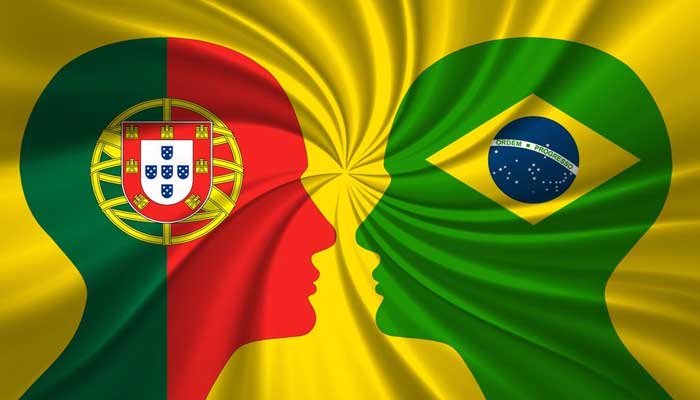Did you know that the Portuguese language is spoken not only in Portugal but also in Brazil and in several other countries of Africa? Although it is the same language, it changes a little according to the place where it is.
This happens mainly between Portugal and Brazil and that’s what we’re going to talk about today.

Main Differences
It’s important to know that the biggest difference between is not always noticed in the way words are written, but in the way they are pronounced. The main disparities are related not only to the vocabulary itself, but there are also dissimilarities in relation to syntax and phonetics – the accent.
About The Grammar:
- In first place, to say “you” in Brazil, they always use the form “você”, whereas in Portugal, we use the form “tu” and “você”.
“Tu” is used for informal situations (to treat our friends and people with whom we get along pretty well, or for treat young people). “Você” is used for formal situations (to be more polite or show more respect to a person). We use “você” with people we don’t know very well or we don’t know at all, or for people older than us.
Example: The sentence “Você está bem?” (Are you ok?) works in brasil for all the contexts. In Portugal we can say “Tu estás bem?” or “Você está bem?” depending if the situation is informal or formal.
- Then in Brazilian Portuguese the pronoun comes always before the verb, unlike the Portuguese from Portugal.
Example: The sentence “Eu chamo-me Pedro” (My name is Pedro) changes to “Me chamo Pedro” in Brazilian Portuguese.
- Besides, in Brazil they don’t use the article before the possessive pronouns.
EXAMPLE: The sentence “O meu livro” (my book), changes to (just) “Meu livro” in Brazilian Portuguese, like happens in English too.
- At last, in Brazil, the gerund is used for current actions, as in Portugal we use the verb “ESTAR” + A + infinitive.
Example: In Portugal we can hear all the time “Estou a comer” (I’m eating), “Estou a andar” (I’m walking); “Estou a estudar” (I’m studying). In Brazil we can hear the same as “Estou comendo”; “Estou andando”; “Estou estudando”, etc.
ABOUT Pronunciation and orthography
- First, the sound “T” is usually replaced by the sound “TCHI”.
Example: The words “diferente” (different), “felizmente” (fortunately), “gente” (people) are read like “diferentchi”, “felizmentchi” and “gentchi”.
- Likewise, the sound “DI” is usually replaced by the sound “DJI”.
Example: The words “dia” (day), “pedido” (request) and “perdido” (lost) are read like “djia”, “pedjido” “perdjido”.
- And the sound “L” is usually replaced by the sound “U”.
Example: The word “possível” (possible) is spoken in Portugal as “possível” but in Brazil the same word is spoken like “Possíveu” leaving the “U” well marked.
- As well as the letter “s” in the end of a word or before a consonant is read like “s”. In European Portuguese we do the sound “sh” in those situations.
Example: The words animais (animals) and “restos” (leftovers) in European Portuguese are read as “animaish” and “rechtosh”.
- And the vowels, in every word, are always open, unlike the Portuguese from Portugal.
Example: The words “diferente”, “divertida” and “rapariga” are read like “Díféréntchí”, “dívértídá” and “rápárígá” in Portuguese from Brazil.
- And finally, in European and Brazilian Portuguese we have, usually, the exact same words with the same meaning, but the words are accented differently.
Example: In Portugal we have the words “bónus” (bonus), “económico” (economic), and “académico” (academic). In Brazil they have the same words with a different accent: “bônus”, “econômico” and “acadêmico” because the pronunciation it’s a little different too.
Same Meaning But Different Words
However, there are still those words that have the exact same meaning, but they are different. Some of those may confuse a Brazilian or Portuguese person in a conversation between them.
To help you understand, check out the table and phrases with words that mean the same thing, but they are not exactly applied in the same way in both countries.
| ENGLISH | PORTUGUESE (PORTUGAL) | PORTUGUESE (BRAZIL) |
|---|---|---|
| Nice | Fixe, porreiro | Legal |
| Fridge | Frigorífico | Geladeira |
| Ride | Boleia | Carona |
| Kid/child | Criança | Moleque |
| Team | Equipa | Time |
| Suit | Fato | Terno |
| Juice | Sumo | Suco |
| Ice-cream | Gelado | Sorvete |
| Air Hostess | Hospedeira | Aeromoça |
| Bathroom | Casa de banho | Banheiro |
| Butcher | Talho | Açougue |
| Flushing | Autoclismo | Descarga |
| (catch a) Cold | Constipação | Resfriado |
| Beer | Cerveja / Imperial | Chope |
| Cell phone | Telemóvel | Celular |
| Train | Comboio | Trem |
| Bus stop | Paragem de autocarros | Ponto de ônibus |
Conclusion
To sum up, you can go and speak Portuguese in Brazil and in some countries in Africa. It is because despite a few differences, is totally understandable among Portuguese speakers, no matter what country you are in.
Sometimes our students don’t recognize at first a Brazilian speaker, which is understandable, because we teach European Portuguese. However, since you are learning the Portuguese language, why don’t know it all?
If you wish, we are more than welcome to help you more. Just contact us in Porto or Caldas da Rainha.
